-
The legacy of Chernobyl -- 30 years on
The 26 April 2016 marks the 30th anniversary of the Chernobyl nuclear accident. For many, especially those born since 1986, it is a word they know without appreciating the full significance of what happened on that day. For others, it was a life changing catastrophe which resulted in largest release of radioactivity in the history of nuclear energy.
-
-
Dealing with irradiated nuclear graphite
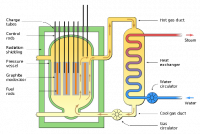
Since the beginning of the nuclear power industry, a large number of channel uranium-graphite nuclear power reactors was built across the world. To date, they all are on the output stage of the operation or decommissioning preparation. Approximately 250,000 tons of irradiated graphite are accumulated in the world, including ~ 60,000 tons in Russia. Due to the specificity of irradiated graphite, the treatment of this type of radioactive waste has not been determined yet.
-
-
Forget Fukushima: Chernobyl still holds record as worst nuclear accident for public health
The 1986 Chernobyl and 2011 Fukushima nuclear power plant accidents both share the notorious distinction of attaining the highest accident rating on the International Atomic Energy Agency (IAEA) scale of nuclear accidents. No other reactor incident has ever received this Level 7 “major accident” designation in the history of nuclear power. But the IAEA scale isn’t designed to measure public health impact. Chernobyl is by far the worst nuclear power plant accident of all time. It was a totally human-made event which was made worse by incompetent workers who did all the wrong things when attempting to avert a meltdown. Fukushima in contrast, was an unfortunate natural disaster – caused by a tsunami that flooded reactor basements — and the workers acted responsibly to mitigate the damage despite loss of electrical power. In terms of health ramifications, these two nuclear accidents were not even in the same league. While Fukushima involved radioactivity exposures to hundreds of thousands of people, Chernobyl exposed hundreds of millions. And millions of those received substantially more exposure than the people of Fukushima.
-
-
Changing climate in Michigan poses an emerging public health threat

Changing climate conditions — including warmer temperatures and an increased frequency of heavy rainstorms — represent “an emerging threat to public health in Michigan,” according to a new report from University of Michigan researchers and state health officials.
-
-
Infectious outbreaks must be combatted strategically: Experts
New funding is not enough to guarantee success against emerging infectious diseases around the world. Rather, good governance, a long-term technology investment strategy, and strong product management skills are essential. As momentum builds for an international effort to develop drugs and vaccines for emerging infectious diseases, experts examine U.S. biodefense programs to understand approaches that might work and developed a global strategy for countermeasure development.
-
-
Stagnant U.S. funding for tools against infectious diseases leaves U.S., world at serious risk
As Congress grapples with the White House on how to fund an emergency response to fight Zika virus, a new report warns that overall underfunding for development of lifesaving tools against neglected global diseases is putting the United States and the world at risk, and that emergency funding cannot be allowed to substitute for sustained U.S. investment in research and development (R&D) of global health technologies. A recent study that examined the risk of infectious disease outbreaks projected that large-scale global disease pandemics could cost the global economy more than $60 billion a year, while investing in the interventions needed to protect against these outbreaks, including R&D, would cost only a fraction of that — $4.5 billion — each year.
-
-
Resistance-proof antiviral can treat many diseases
Scientists and health officials are marshalling forces to fight Zika, the latest in a string of recent outbreaks. Many of these efforts target that virus specifically, but some researchers are looking for a broader approach. The new strategy aims to fight a wide range of viruses that appears to be safe in vivo and could evade a virus’s ability to develop resistance.
-
-
New Yorker sentenced to 16 years for trying to buy ricin
It was a scary scenario: Chinese national Cheng Le, living in New York City, attempted to order ricin through the so-called dark Web. Ricin is a highly potent and potentially fatal toxin with no known antidote. What did Le plan to do with the ricin? Nothing good. According to U.S. Attorney for the Southern District of New York Preet Bharara, “In Le’s own words, established at trial, he was looking for ‘simple and easy death pills’ and ways to commit ‘100 percent risk-free’ murder.”
-
-
Global warming could help crops’ productivity
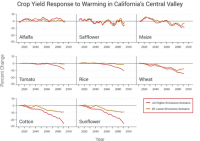
Many scientists fear that global warming will hit staple food crops hard, with heat stress, extreme weather events, and water shortages. On the other hand, higher levels of carbon dioxide — the main cause of ongoing warming — is known to boost many plants’ productivity, and reduce their use of water. So, if we keep pouring more CO2 into the air, will crops fail, or benefit? A new study tries to disentangle this complex question. It suggests that while greater warmth will reduce yields of some crops, higher CO2 could help mitigate the effects in some regions, unless other complications of global warming interfere.
-
-
Congress’ inaction hobbles U.S. preparation for a major Zika virus outbreak: Experts

Despite dire predictions that the Zika virus could affect much of the United States including large cities this summer, the country is unprepared, and the financial and moral consequences could be significant. Earlier this year, President Barack Obama requested $1.86 billion for surveillance, mosquito control, research and health services, but Congress has not approved the funding. In the absence of Congressional action, the president reallocated $589 million of designated Ebola funds to Zika preparedness, research and the creation of response teams. “The nation’s state of preparedness is compromised by Congress’s inaction on supplemental funding and the weak capacities and powers of states and localities,” two public health experts say.
-
-
Haiti’s cholera epidemic could have been prevented with low-cost approaches
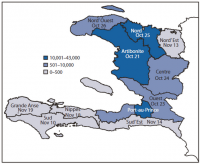
Haiti’s cholera epidemic killed close to 9,000 people and hospitalized hundreds of thousands more. The epidemic also spread to several neighboring countries. Cholera remains a critical risk for UN peacekeeping operations, years after Nepalese troops inadvertently introduced the disease to Haiti in fall of 2010 and triggered one of the worst epidemics in recent years. Researchers have found that simple and inexpensive interventions — which the United Nations has yet to implement — would be effective in preventing future outbreaks of the bacterial infection.
-
-
New way to clean contaminated groundwater

A team of researchers has helped discover a new chemical method to immobilize uranium in contaminated groundwater, which could lead to more precise and successful water remediation efforts at former nuclear sites. Uranium is present in contaminated groundwater at various sites in the United States as a legacy of Cold War-era processing and waste disposal activities associated with nuclear materials production.
-
-
Zika virus “scarier than we initially thought”: U.S. health officials
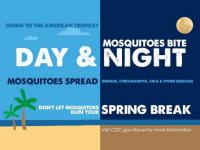
Dr. Anne Schuchat from the Centre for Disease Control and Prevention (CDC) said the Zika virus is more of a threat than previously thought. Speaking at a White House press conference, she said there was potential for the virus to spread to more U.S. states than experts first believed. “Most of what we’ve learned is not reassuring. Everything we look at with this virus seems to be a bit scarier than we initially thought,” she told reporters.
-
-
Novel alignment-free sequence descriptors in Zika virus characterization
The recent epidemic of Zika virus infections in South and Latin America has raised serious concerns on its ramifications for the population in the Americas and spread of the virus worldwide. Researchers explain their research on computer-assisted approaches toward surveillance and consequent design of drugs and vaccines to combat the growth and spread of the Zika virus.
-
-
Limited awareness or concern about Zika virus in U.S.
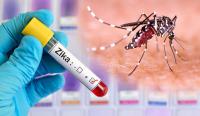
A recent survey by the Associated Press-NORC Center for Public Affairs Research finds that three-quarters of Americans who have heard at least a little about the Zika virus are aware that the virus is linked to birth defects in babies born to infected mothers. However, the survey found that most Americans are unclear about the availability of tests to diagnose Zika and whether or not preventative vaccines and effective medicines exist to treat it.
-
More headlines
The long view
We Ran the C.D.C.: Kennedy Is Endangering Every American’s Health
Nine former leaders of the Centers for Disease Control and Prevention (CDC), who served as directors or acting directors under Republican and Democratic administrations, serving under presidents from Jimmy Carter to Donald Trrump, argue that HHS Secretary Roert F. Kennedy Jr. poses a clear and present danger to the health of Americans. He has placed anti-vaxxers and conspiracy theorists at top HHS positions, and he appears to be guided by a hostility to science and a belief in bizarre, unscientific approaches to public health.
